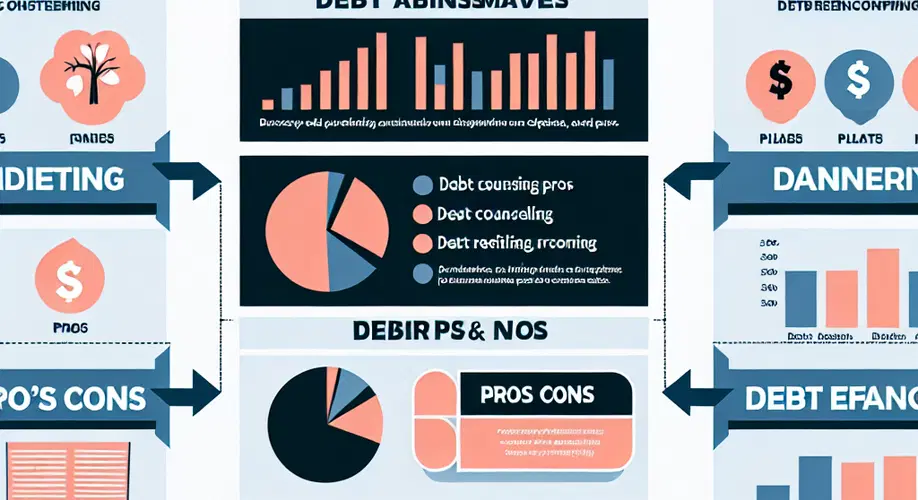Are you looking for DEBT RELIEF answers? Call toll-free 866-250-6599

Understanding Bankruptcy Alternatives: Pros and Cons of Non-Bankruptcy Debt Relief
When it comes to navigating the treacherous waters of financial hardship, understanding the spectrum of bankruptcy alternatives is crucial. Non-bankruptcy debt relief mechanisms, such as debt consolidation and credit counseling, provide a lifeline for those seeking to avoid the lasting stigma of a bankruptcy record. However, these options come with their own set of pros and cons. While they can offer a more manageable repayment plan and potentially lower interest rates, they may also require longer repayment periods and could still impact your credit score.
Identifying reputable and accredited debt relief agencies is the cornerstone of formulating a sound debt relief strategy. Accredited debt services undergo rigorous evaluation to earn their status, ensuring they adhere to ethical practices and provide dependable advice. By seeking out these accredited experts, individuals can gain a clearer understanding of their financial situation and receive tailored recommendations for their specific circumstances. Nonetheless, it is imperative to scrutinize the reviews and track records of these agencies to avoid potential pitfalls and conflicts of interest.
When examining the long-term impacts of different debt relief options, it is essential to conduct a comparative analysis that scrutinizes each alternative's implications. Debt consolidation companies may offer streamlined payments, but it's important to consider the total cost over time. In contrast, credit counseling can help develop financial literacy and budgeting skills but might not be suitable for those with extensive debt loads. Ultimately, navigating these options requires a thoughtful approach, taking into account personal financial goals and the potential for future financial stability.
Evaluating Accredited Debt Relief Agencies: A Guide to Professional Debt Help
Debt consolidation companies have emerged as a popular alternative for individuals seeking relief from overwhelming financial burdens without resorting to bankruptcy. These entities offer a structured approach to combining multiple debts into a single, typically lower-interest loan, making repayments more manageable. The advantages of this strategy include simplifying monthly payments and potentially reducing the total interest paid. However, consumers must exercise caution and conduct thorough research to ensure they partner with reputable companies that offer transparent terms and affordable rates.
Credit relief programs are another viable option, especially for those feeling the weight of high credit card balances and other unsecured debts. Accredited debt relief agencies often provide services like debt settlement or management plans designed to negotiate with creditors for reduced payoffs or more favorable terms. This path can lead to decreased debt amounts or lower monthly payments, assisting individuals to regain financial stability. Still, it's important to read accredited reviews and understand each program's potential impact on one's credit score before making a commitment.
A thorough comparative analysis of various debt relief options is essential for a complete understanding of their potential long-term impacts. While some may offer immediate relief, they could entail hidden risks or consequences that surface over time. For example, while debt consolidation can lower interest rates, it may also lead to a longer repayment period. Similarly, settling debts for less than the owed amount can significantly affect creditworthiness. Ultimately, the best choice relies on individual circumstances and the advice of trusted financial counselors.
Comparative Analysis: A Closer Look at Debt Relief Options and Their Long-Term Impacts
When it comes to navigating financial hardship programs, understanding the available options outside of bankruptcy is essential. Debt relief alternatives often include debt settlement, debt management plans, and credit counseling. Each of these non-bankruptcy solutions comes with its own set of pros and cons. For example, while debt settlement can reduce the amount owed, it may also have a negative impact on your credit score. Conversely, debt management plans can help streamline payments without as much damage to credit standing, provided you adhere to the agreed-upon terms.
An essential step in seeking financial relief is to evaluate accredited debt relief agencies. These agencies offer professional debt help, assisting individuals in navigating complicated financial terrain. The right agency can tailor a plan that addresses unique financial situations effectively. However, it is crucial to conduct thorough reviews and check for accreditation to avoid falling prey to scams. Accredited agencies adhere to industry standards, ensuring ethical practices and transparent dealings with clients.
The comparative analysis of debt relief options provides insight into their long-term impacts on individual finances. It's important to consider how each option aligns with personal financial goals and the potential consequences over time. For instance, debt consolidation may simplify payments and possibly reduce interest rates, but it won't reduce the principal amount owed. In-depth reviews of accredited debt services can reveal success rates and client satisfaction, informing better decision-making for those in need of debt relief.









